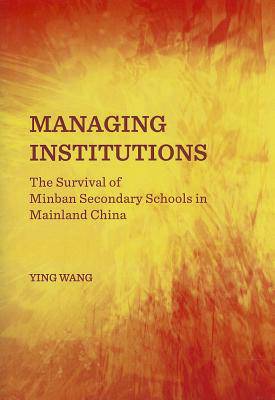
- Retrait gratuit dans votre magasin Club
- 7.000.000 titres dans notre catalogue
- Payer en toute sécurité
- Toujours un magasin près de chez vous
- Retrait gratuit dans votre magasin Club
- 7.000.0000 titres dans notre catalogue
- Payer en toute sécurité
- Toujours un magasin près de chez vous
Managing Institutions: The Survival of Minban Secondary Schools in Mainland China
Ying Wang
Livre relié | Anglais
128,95 €
+ 257 points
Description
Minban schools have established their position in China's education system. This book applies the theories of new institutionalism to the minban school as an organization and as a party in relationships with other institutions. It explores the features of the evolving institutional environment of education and the strategies that minban schools have adopted to manage the institutions in this environment. There are four types of minban schools: the international minban school, the privately funded minban school, the publicly affiliated minban school, and the converted minban school. A qualitative research methodology in the form of a multiple-case study was used for the analysis. Eight minban secondary schools in Taiyuan and Shenzhen were chosen to represent the various types of minban schools. The study shows that the re-emergence of free market principles, the decentralization of government and the accompanying segmentation of power and authority, bureaucratic and consumerist expectations of teachers, and the commodification of education have engendered an increasingly fragmented institutional environment, which allowed minban schools to thrive. The book reveals that the institutional environment is multi-faceted and ambiguous: during China's controlled decentralization, organizations and institutions have shaped each other. Minban schools adopt various strategies to cope with institutional pressure. This study provides a systematic understanding of the operation of minban schools by locating the schools in a 'differential order', which determines their choice of strategy: international schools choose isolation; privately funded schools, avoidance; affiliated schools, advocacy; and converted schools, capitalization. It also illustrates how the bureaucracy functions in China's local governments. The various case studies confirm that the government still maintains substantial control over minban schools through the power granted by the bureaucratic structure, which allows them to direct the institutional environment by introducing new regulations and forms of governance.
Spécifications
Parties prenantes
- Auteur(s) :
- Editeur:
Contenu
- Nombre de pages :
- 245
- Langue:
- Anglais
Caractéristiques
- EAN:
- 9781443851688
- Date de parution :
- 01-11-13
- Format:
- Livre relié
- Format numérique:
- Genaaid
- Dimensions :
- 152 mm x 208 mm
- Poids :
- 476 g

Les avis
Nous publions uniquement les avis qui respectent les conditions requises. Consultez nos conditions pour les avis.






